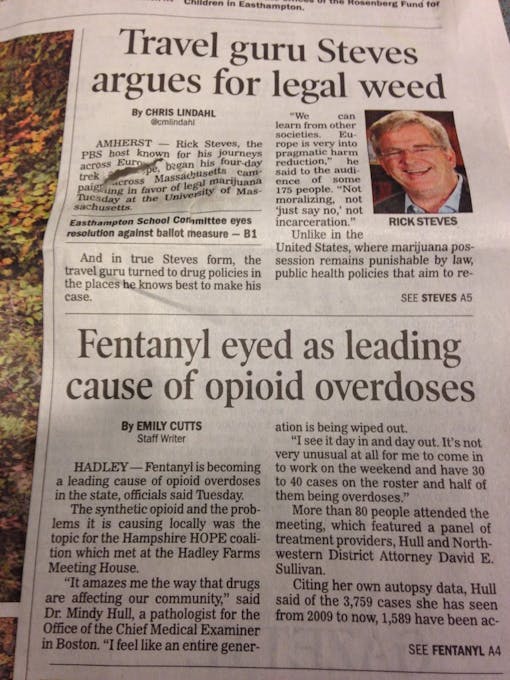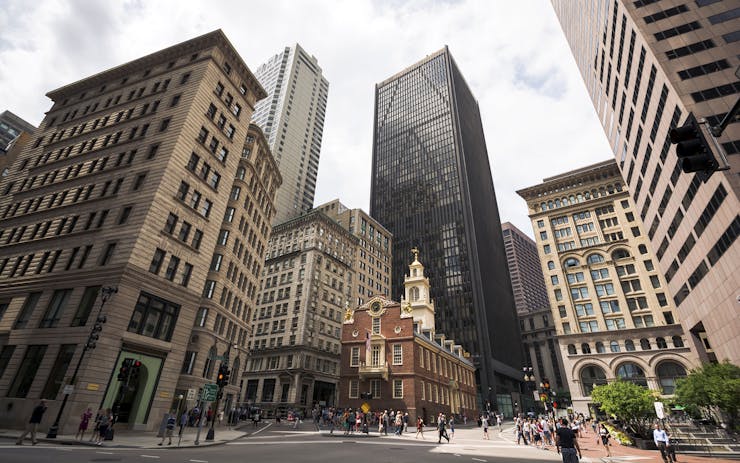Legalization proponents in Massachusetts woke up to a stunner this morning. The Boston Globereported that Question 4, the state measure to legalize and regulate the adult use of cannabis, has jumped out to a 15-point lead in the latest poll.
A WBUR poll conducted last week found that 55 percent of voters now lean in favor of the measure, with 40 percent opposed. That’s a movement of 10 percentage points—an enormous shift in politics—from last month, when the same poll found the race split 50–45.
A stunner: Legalization in Massachusetts now leads 55% to 40%.
The poll marks a momentous turnaround in the legalization race. Last spring, Question 4 advocates found themselves facing an electorate little interested in legalization. State officials including Gov. Charlie Baker, Boston Mayor Marty Walsh, and Attorney General Maura Healey came out strongly opposed to the measure. Their vocal opposition, laid out in a Globe op-ed, drove early negatives on the measure. “Kids in states that have legalized marijuana have easier access to the drug,” they claimed, contrary to the early data from Colorado and Washington.
Early polling had the measure losing, 50 percent to 40.
Then, just after Labor Day, something changed. The polls reversed themselves. One survey had the voters running 53–41 in favor of legalization. A September poll from WBUR found the split 50–45 in favor of passage.
What led to the turnaround?
“Two things,” says Jim Borghesani. He’s the communications director for the Campaign to Regulate Marijuana Like Alcohol in Massachusetts, the Yes on 4 folks. “First, we never quite believed the early polls. We thought it was close, but we didn’t think we were underwater. Those early polls didn’t reach voters using cell phones, and our base is a younger base.” Polls show voters in their 20s and 30s tend to be the most supportive of legalization.
The second thing that’s happened, says Borghesani, is that political leaders and medical professionals have now come out to publicly support Question 4. That has gone a long way to help combat opponents’ misleading campaign claims.
In the past two months, Sen. Elizabeth Warren, Rep. Seth Moulton, Rep. Michael Capuano, and former Gov. William Weld have all come forward to support the measure publicly. So has Boston City Council President Michelle Wu as well as former state troopers, police officers, and state assistant attorney generals. Retired Boston Police Lt. Tom Nolan, who looks like he plays a tough Boston cop on a TV show about tough Boston cops, called Question 4 “the smaht choice.”
Widespread support from doctors and nurses has proven to be a powerful political signal. “We now have more than a hundred physicians supporting us,” Borghesani says. Those supporters include Dr. Alan Wartenberg, former president of the state chapter of the American Society of Addiction Medicine, and Dr. Susan Lucas, who taped this video for the campaign:
Last week a third factor entered the race: Rick Steves.
The happy cannabis crusader
I happened to be on a three-day excursion across Massachusetts last week, accompanying my daughter on a tour of prospective colleges. Practically everywhere I went, I heard the warm, reassuring voice of the PBS travel show host. Steves was barnstorming across the state for Question 4. (Read more about the tour from Leafly correspondent Dan McCarthy.

In this 2012 photo, travel guide author and marijuana legalization supporter Rick Steves holds a plastic marijuana leaf necklace as he sits with a poster used to advertise his travel business in Edmonds, Wash. (Elaine Thompson/AP)
In the pages of the Boston Globe and the Daily Hampshire Gazette, Steves laid out many of the same arguments that helped pass Initiative 502 in his (and my) home state of Washington in 2012. But this time around, Steves had four years of positive experience and data to work with. “What we’ve found is no rise in crime, no increase in teen use, and our arrests for possession have gone to nearly zero,” I heard him tell morning host Bill Newman on WHMP in Northampton.
As he spoke, you could practically hear votes flip for Question 4. As a trusted icon reassuring wary Americans about cannabis legalization, Steves has no peer. He helped open my mind four years ago, and he did the same for untold numbers of voters in the Northeast.
On Friday, as Steves turned north toward Maine and its own legalization campaign, legalization opponents in Massachusetts announced that Sheldon Adelson, prohibition’s Daddy Warbucks, had given the No on 4 campaign a much-needed infusion of $1 million. The timing may have been a coincidence. But it sure felt like a rearguard action to shore up the losses inflicted by the gregarious travel guide.
Old fears die hard
It’s impossible to prove that Steves’s statewide tour bumped the new poll numbers, but it certainly didn’t hurt. And it’ll be interesting to see how Adelson’s $1 million donation plays out over the next three weeks. That money will buy a lot of TV advertising time. And ads like the one below, created by the Campaign for a Safe and Healthy Massachusetts, can be strong persuaders.
For those of us living in legal states, it’s easy to forget how tough it can be to assure voters that legalization won’t unleash havoc in the streets. I gave two radio interviews in Boston last week, and the same questions came up again and again. What about the stories we hear about kids eating edibles and ending up in the ER? Why are drugged driving numbers spiking? (They aren’t.) Won’t Big Marijuana just steamroll the legislature once they start making a profit?
Of course, a billion-dollar cannabis industry already exists in Massachusetts. It’s simply underground, untaxed, and unregulated. But legalization opponents clearly see child-danger, impaired driving, and the specter of big marijuana as themes that will resonate with voters.
I’m confused. Isn’t this a reliably blue state?
Yes and no. When it comes to politics, there are two states of Massachusetts.
On the Electoral College map, the state runs so deeply liberal that Pantone could use it to define the color blue. Massachusetts has tipped red only twice—for Eisenhower and Reagan—since 1924. Boston practically invented the liberal Democrat: the Kennedys, Tip O’Neil, Michael Dukakis, John Kerry, Elizabeth Warren.
Internally, Massachusetts is a different beast. Republican governors—William Weld, Mitt Romney, and current Gov. Charlie Baker—regularly find favor. “People assume Massachusetts is progressive in a uniform way, but that’s not the case,” says Dan Delaney, a former state official and current political consultant in Boston. “We’re a blue-blue-blue state, but we also have a strong working-class, Puritan ethos.” Delaney, by the way, is a firm believer in medical marijuana but came out opposed to Question 4. Massachusetts: It’s complicated.
A prim and proper thread is woven into the local culture. Shirts stay buttoned up. Skirts brush ankles. There’s a reason “banned in Boston” was once shorthand for prudish censorship.
The state, and Boston in particular, is also a global hub for health care practice and research. Questions of addiction and the public-health ramifications of legalization play a larger role here than in just about any other state.

Cannabis and opioids in the Daily Hampshire Gazette: How the gateway myth gets perpetuated. Bruce Barcott/Leafly
The opioid crisis has hit the Northeast like a winter storm. Heroin and fentanyl stories have become a staple of the Boston Globe. When I was in the city last May, the Globe ran a front-pager about condo owners bracing their front doors with two-by-fours against break-ins by addicts seeking drugs and cash.
If science swayed votes, this would be an issue for legalization advocates to emphasize. Studies have shown that opioid use and overdose deaths decrease markedly in states that legalize medical and adult-use marijuana. We’re talking hundreds of human lives. But science takes time to seep into public consciousness. Those are recent studies, and they have to become common knowledge before they can overturn decades of propaganda about cannabis as a “gateway drug.” The opioid crisis was used to defeat legalization earlier this year in Vermont, and it’s being used by the No on 4 folks to call undecided voters into their camp. (Maine, meanwhile, was so excited by the potential for cannabis to curb overdose deaths that the state legislature considered adding opioid addiction as a qualifying condition for medical marijuana.)
It’s a tough issue to overcome. One day last week, the front page of Northampton’s Daily Hampshire Gazette carried a story headlined “Travel guru Steves argues for legal weed”. Directly beneath it, in what might have been a local editor’s misguided attempt at balance, ran a story headlined, “Fentanyl eyed as leading cause of opioid overdoses.”
Old drug war tropes die hard. But if the latest WBUR poll is an indication, they can be broken by straight talk from trusted sources, such as Rick Steves, Sen. Elizabeth Warren, and the doctors and nurses of Massachusetts.





